Essential Nursing Care: Pre-operative Assessment, ISBAR & Mr. Panang
VerifiedAdded on 2023/06/09
|10
|2271
|291
Report
AI Summary
This report provides a comprehensive overview of essential nursing care, focusing on the pre- and post-operative phases of patient care, particularly in the context of an elderly patient undergoing hip surgery. It details the importance of pre-operative health assessments to prevent harm, including cardiac and pulmonary considerations, and emphasizes the role of a multidisciplinary team in planning and delivering effective care. The report also discusses the pharmacodynamics and pharmacokinetics of medications commonly used in such cases, highlighting their impact on the patient's condition. Furthermore, it addresses the post-operative recovery phase, emphasizing risk assessment and patient education strategies. The ISBAR framework is demonstrated for effective patient handover, ensuring continuity of care. Desklib offers a wealth of similar solved assignments and study resources for nursing students.
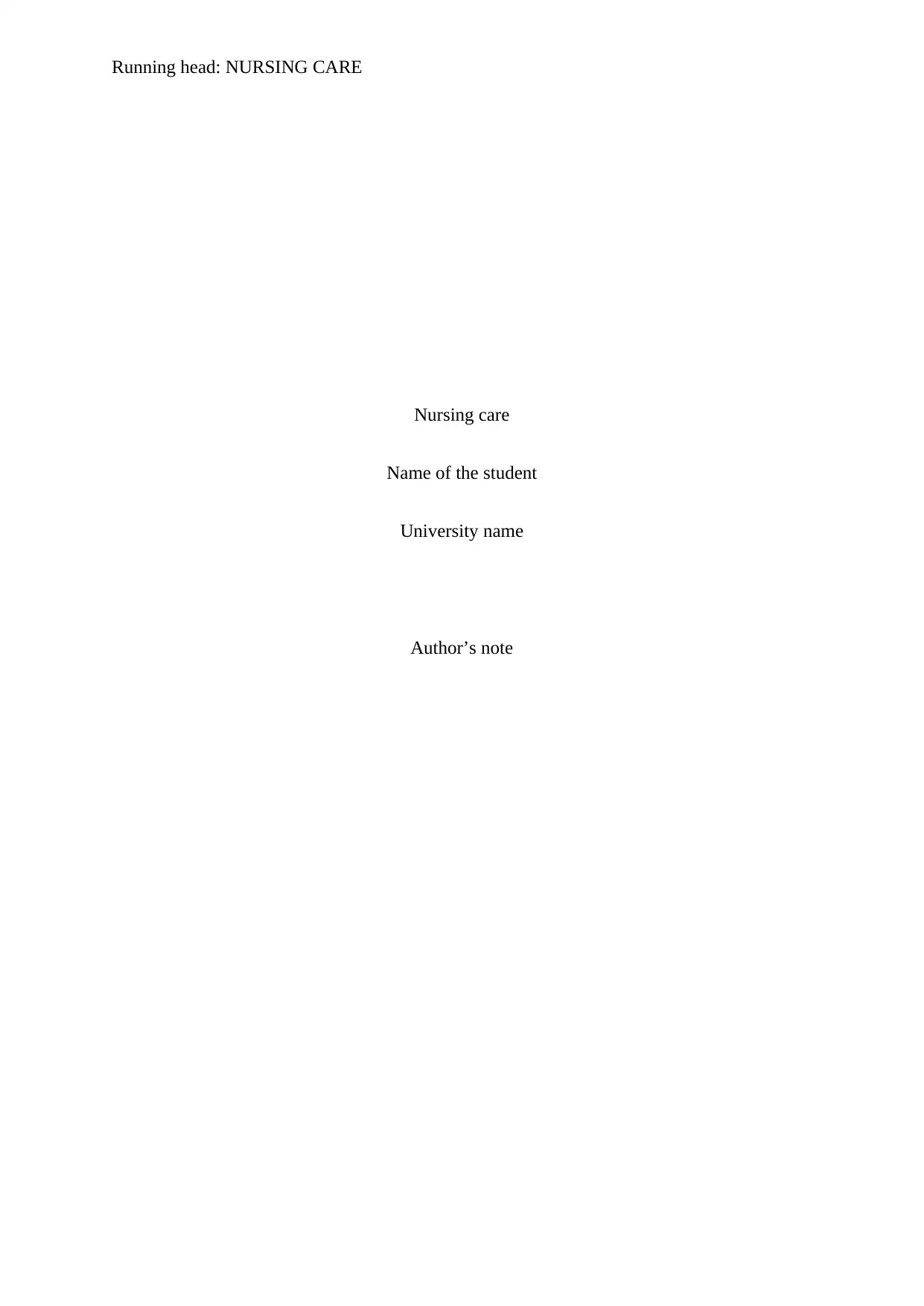
Running head: NURSING CARE
Nursing care
Name of the student
University name
Author’s note
Nursing care
Name of the student
University name
Author’s note
Paraphrase This Document
Need a fresh take? Get an instant paraphrase of this document with our AI Paraphraser
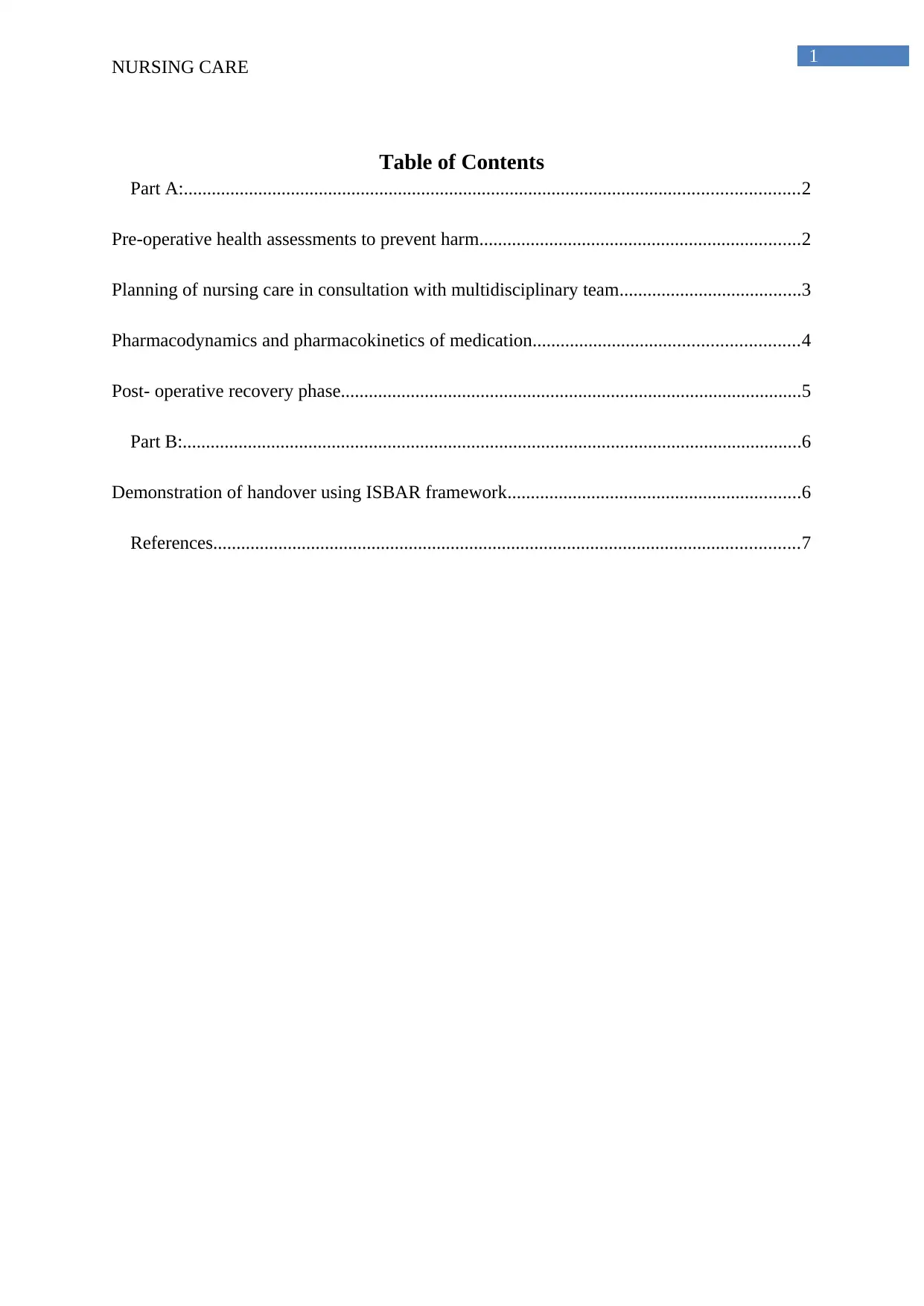
1
NURSING CARE
Table of Contents
Part A:....................................................................................................................................2
Pre-operative health assessments to prevent harm.....................................................................2
Planning of nursing care in consultation with multidisciplinary team.......................................3
Pharmacodynamics and pharmacokinetics of medication.........................................................4
Post- operative recovery phase...................................................................................................5
Part B:.....................................................................................................................................6
Demonstration of handover using ISBAR framework...............................................................6
References..............................................................................................................................7
NURSING CARE
Table of Contents
Part A:....................................................................................................................................2
Pre-operative health assessments to prevent harm.....................................................................2
Planning of nursing care in consultation with multidisciplinary team.......................................3
Pharmacodynamics and pharmacokinetics of medication.........................................................4
Post- operative recovery phase...................................................................................................5
Part B:.....................................................................................................................................6
Demonstration of handover using ISBAR framework...............................................................6
References..............................................................................................................................7
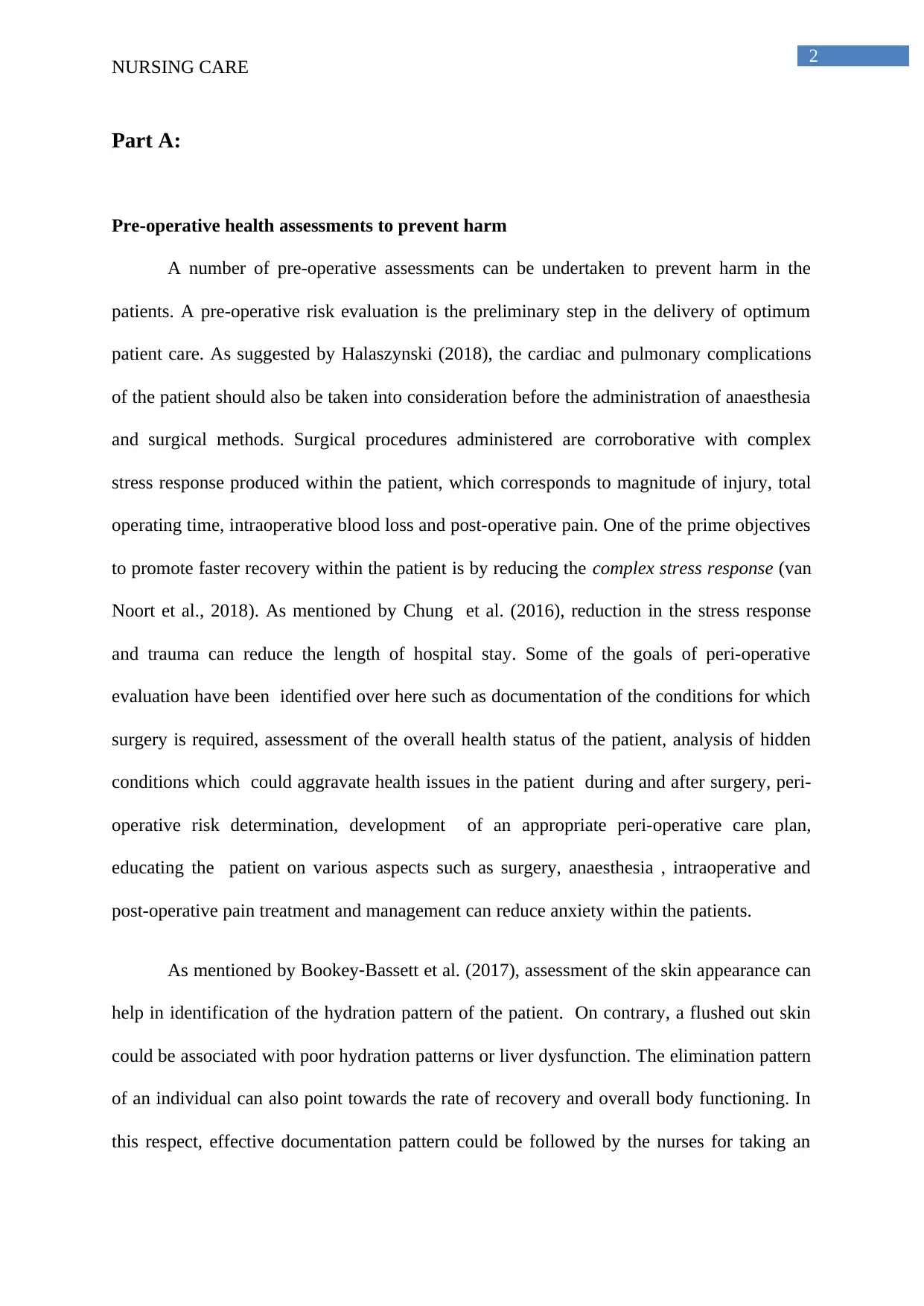
2
NURSING CARE
Part A:
Pre-operative health assessments to prevent harm
A number of pre-operative assessments can be undertaken to prevent harm in the
patients. A pre-operative risk evaluation is the preliminary step in the delivery of optimum
patient care. As suggested by Halaszynski (2018), the cardiac and pulmonary complications
of the patient should also be taken into consideration before the administration of anaesthesia
and surgical methods. Surgical procedures administered are corroborative with complex
stress response produced within the patient, which corresponds to magnitude of injury, total
operating time, intraoperative blood loss and post-operative pain. One of the prime objectives
to promote faster recovery within the patient is by reducing the complex stress response (van
Noort et al., 2018). As mentioned by Chung et al. (2016), reduction in the stress response
and trauma can reduce the length of hospital stay. Some of the goals of peri-operative
evaluation have been identified over here such as documentation of the conditions for which
surgery is required, assessment of the overall health status of the patient, analysis of hidden
conditions which could aggravate health issues in the patient during and after surgery, peri-
operative risk determination, development of an appropriate peri-operative care plan,
educating the patient on various aspects such as surgery, anaesthesia , intraoperative and
post-operative pain treatment and management can reduce anxiety within the patients.
As mentioned by Bookey‐Bassett et al. (2017), assessment of the skin appearance can
help in identification of the hydration pattern of the patient. On contrary, a flushed out skin
could be associated with poor hydration patterns or liver dysfunction. The elimination pattern
of an individual can also point towards the rate of recovery and overall body functioning. In
this respect, effective documentation pattern could be followed by the nurses for taking an
NURSING CARE
Part A:
Pre-operative health assessments to prevent harm
A number of pre-operative assessments can be undertaken to prevent harm in the
patients. A pre-operative risk evaluation is the preliminary step in the delivery of optimum
patient care. As suggested by Halaszynski (2018), the cardiac and pulmonary complications
of the patient should also be taken into consideration before the administration of anaesthesia
and surgical methods. Surgical procedures administered are corroborative with complex
stress response produced within the patient, which corresponds to magnitude of injury, total
operating time, intraoperative blood loss and post-operative pain. One of the prime objectives
to promote faster recovery within the patient is by reducing the complex stress response (van
Noort et al., 2018). As mentioned by Chung et al. (2016), reduction in the stress response
and trauma can reduce the length of hospital stay. Some of the goals of peri-operative
evaluation have been identified over here such as documentation of the conditions for which
surgery is required, assessment of the overall health status of the patient, analysis of hidden
conditions which could aggravate health issues in the patient during and after surgery, peri-
operative risk determination, development of an appropriate peri-operative care plan,
educating the patient on various aspects such as surgery, anaesthesia , intraoperative and
post-operative pain treatment and management can reduce anxiety within the patients.
As mentioned by Bookey‐Bassett et al. (2017), assessment of the skin appearance can
help in identification of the hydration pattern of the patient. On contrary, a flushed out skin
could be associated with poor hydration patterns or liver dysfunction. The elimination pattern
of an individual can also point towards the rate of recovery and overall body functioning. In
this respect, effective documentation pattern could be followed by the nurses for taking an
⊘ This is a preview!⊘
Do you want full access?
Subscribe today to unlock all pages.

Trusted by 1+ million students worldwide
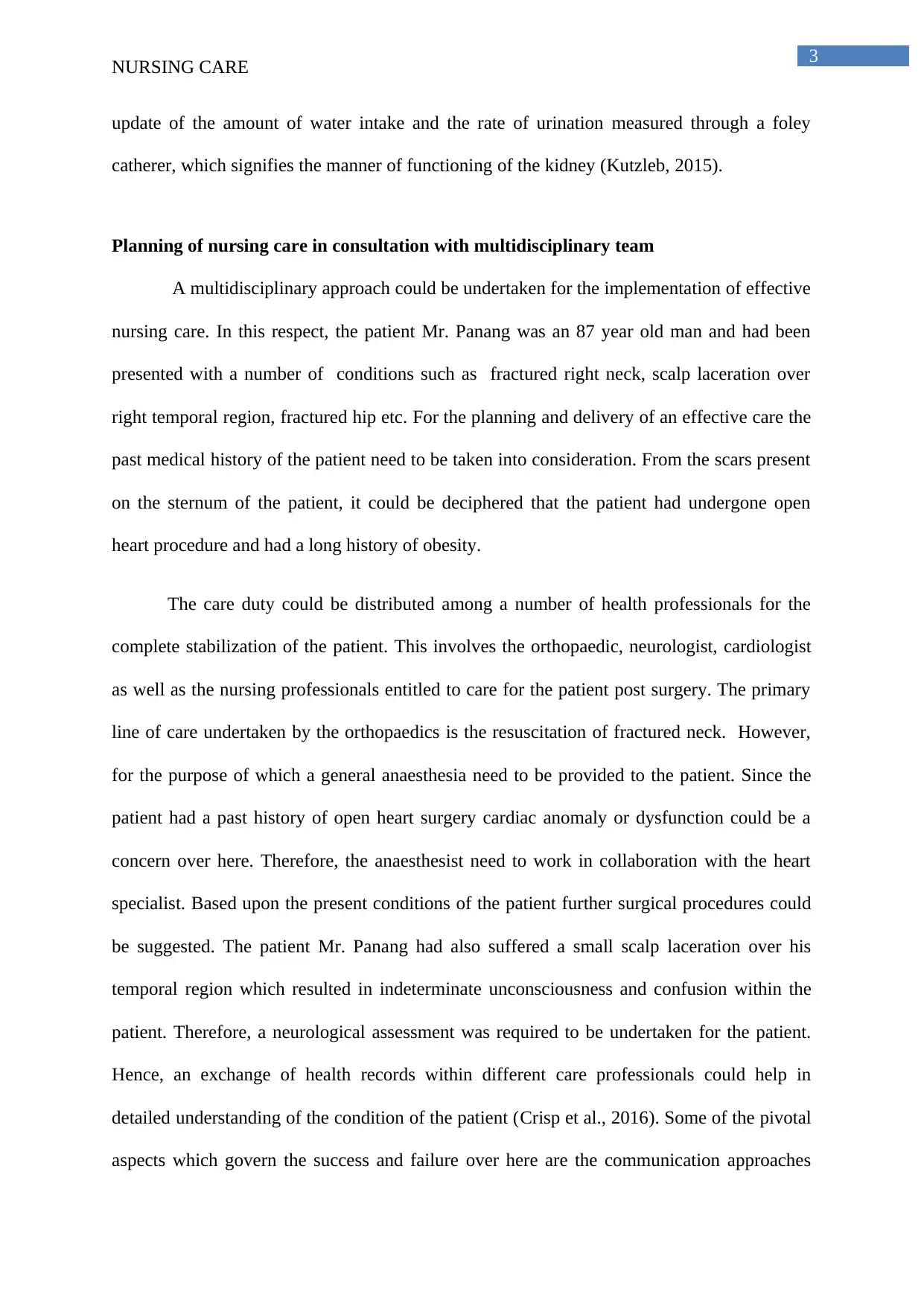
3
NURSING CARE
update of the amount of water intake and the rate of urination measured through a foley
catherer, which signifies the manner of functioning of the kidney (Kutzleb, 2015).
Planning of nursing care in consultation with multidisciplinary team
A multidisciplinary approach could be undertaken for the implementation of effective
nursing care. In this respect, the patient Mr. Panang was an 87 year old man and had been
presented with a number of conditions such as fractured right neck, scalp laceration over
right temporal region, fractured hip etc. For the planning and delivery of an effective care the
past medical history of the patient need to be taken into consideration. From the scars present
on the sternum of the patient, it could be deciphered that the patient had undergone open
heart procedure and had a long history of obesity.
The care duty could be distributed among a number of health professionals for the
complete stabilization of the patient. This involves the orthopaedic, neurologist, cardiologist
as well as the nursing professionals entitled to care for the patient post surgery. The primary
line of care undertaken by the orthopaedics is the resuscitation of fractured neck. However,
for the purpose of which a general anaesthesia need to be provided to the patient. Since the
patient had a past history of open heart surgery cardiac anomaly or dysfunction could be a
concern over here. Therefore, the anaesthesist need to work in collaboration with the heart
specialist. Based upon the present conditions of the patient further surgical procedures could
be suggested. The patient Mr. Panang had also suffered a small scalp laceration over his
temporal region which resulted in indeterminate unconsciousness and confusion within the
patient. Therefore, a neurological assessment was required to be undertaken for the patient.
Hence, an exchange of health records within different care professionals could help in
detailed understanding of the condition of the patient (Crisp et al., 2016). Some of the pivotal
aspects which govern the success and failure over here are the communication approaches
NURSING CARE
update of the amount of water intake and the rate of urination measured through a foley
catherer, which signifies the manner of functioning of the kidney (Kutzleb, 2015).
Planning of nursing care in consultation with multidisciplinary team
A multidisciplinary approach could be undertaken for the implementation of effective
nursing care. In this respect, the patient Mr. Panang was an 87 year old man and had been
presented with a number of conditions such as fractured right neck, scalp laceration over
right temporal region, fractured hip etc. For the planning and delivery of an effective care the
past medical history of the patient need to be taken into consideration. From the scars present
on the sternum of the patient, it could be deciphered that the patient had undergone open
heart procedure and had a long history of obesity.
The care duty could be distributed among a number of health professionals for the
complete stabilization of the patient. This involves the orthopaedic, neurologist, cardiologist
as well as the nursing professionals entitled to care for the patient post surgery. The primary
line of care undertaken by the orthopaedics is the resuscitation of fractured neck. However,
for the purpose of which a general anaesthesia need to be provided to the patient. Since the
patient had a past history of open heart surgery cardiac anomaly or dysfunction could be a
concern over here. Therefore, the anaesthesist need to work in collaboration with the heart
specialist. Based upon the present conditions of the patient further surgical procedures could
be suggested. The patient Mr. Panang had also suffered a small scalp laceration over his
temporal region which resulted in indeterminate unconsciousness and confusion within the
patient. Therefore, a neurological assessment was required to be undertaken for the patient.
Hence, an exchange of health records within different care professionals could help in
detailed understanding of the condition of the patient (Crisp et al., 2016). Some of the pivotal
aspects which govern the success and failure over here are the communication approaches
Paraphrase This Document
Need a fresh take? Get an instant paraphrase of this document with our AI Paraphraser
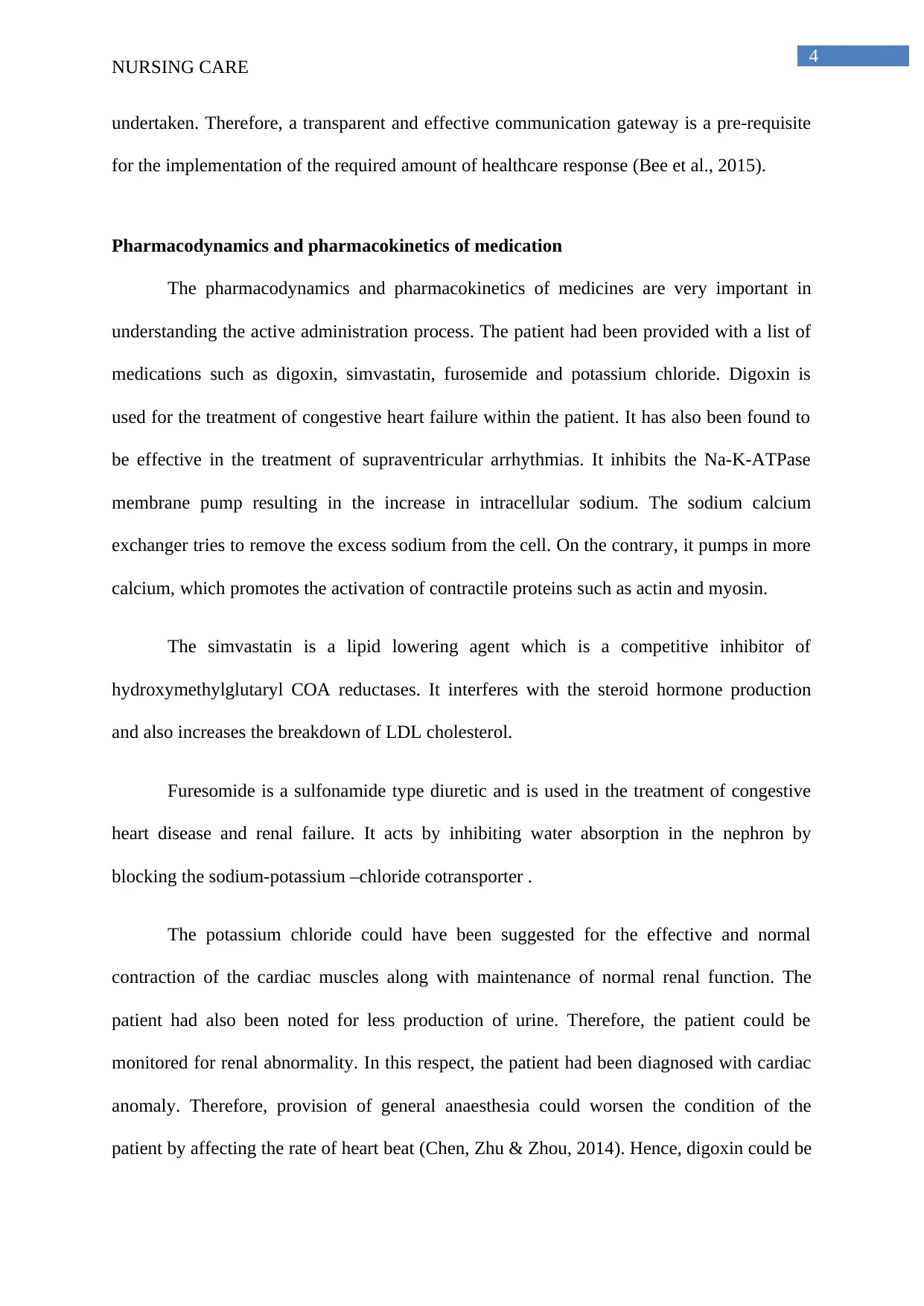
4
NURSING CARE
undertaken. Therefore, a transparent and effective communication gateway is a pre-requisite
for the implementation of the required amount of healthcare response (Bee et al., 2015).
Pharmacodynamics and pharmacokinetics of medication
The pharmacodynamics and pharmacokinetics of medicines are very important in
understanding the active administration process. The patient had been provided with a list of
medications such as digoxin, simvastatin, furosemide and potassium chloride. Digoxin is
used for the treatment of congestive heart failure within the patient. It has also been found to
be effective in the treatment of supraventricular arrhythmias. It inhibits the Na-K-ATPase
membrane pump resulting in the increase in intracellular sodium. The sodium calcium
exchanger tries to remove the excess sodium from the cell. On the contrary, it pumps in more
calcium, which promotes the activation of contractile proteins such as actin and myosin.
The simvastatin is a lipid lowering agent which is a competitive inhibitor of
hydroxymethylglutaryl COA reductases. It interferes with the steroid hormone production
and also increases the breakdown of LDL cholesterol.
Furesomide is a sulfonamide type diuretic and is used in the treatment of congestive
heart disease and renal failure. It acts by inhibiting water absorption in the nephron by
blocking the sodium-potassium –chloride cotransporter .
The potassium chloride could have been suggested for the effective and normal
contraction of the cardiac muscles along with maintenance of normal renal function. The
patient had also been noted for less production of urine. Therefore, the patient could be
monitored for renal abnormality. In this respect, the patient had been diagnosed with cardiac
anomaly. Therefore, provision of general anaesthesia could worsen the condition of the
patient by affecting the rate of heart beat (Chen, Zhu & Zhou, 2014). Hence, digoxin could be
NURSING CARE
undertaken. Therefore, a transparent and effective communication gateway is a pre-requisite
for the implementation of the required amount of healthcare response (Bee et al., 2015).
Pharmacodynamics and pharmacokinetics of medication
The pharmacodynamics and pharmacokinetics of medicines are very important in
understanding the active administration process. The patient had been provided with a list of
medications such as digoxin, simvastatin, furosemide and potassium chloride. Digoxin is
used for the treatment of congestive heart failure within the patient. It has also been found to
be effective in the treatment of supraventricular arrhythmias. It inhibits the Na-K-ATPase
membrane pump resulting in the increase in intracellular sodium. The sodium calcium
exchanger tries to remove the excess sodium from the cell. On the contrary, it pumps in more
calcium, which promotes the activation of contractile proteins such as actin and myosin.
The simvastatin is a lipid lowering agent which is a competitive inhibitor of
hydroxymethylglutaryl COA reductases. It interferes with the steroid hormone production
and also increases the breakdown of LDL cholesterol.
Furesomide is a sulfonamide type diuretic and is used in the treatment of congestive
heart disease and renal failure. It acts by inhibiting water absorption in the nephron by
blocking the sodium-potassium –chloride cotransporter .
The potassium chloride could have been suggested for the effective and normal
contraction of the cardiac muscles along with maintenance of normal renal function. The
patient had also been noted for less production of urine. Therefore, the patient could be
monitored for renal abnormality. In this respect, the patient had been diagnosed with cardiac
anomaly. Therefore, provision of general anaesthesia could worsen the condition of the
patient by affecting the rate of heart beat (Chen, Zhu & Zhou, 2014). Hence, digoxin could be
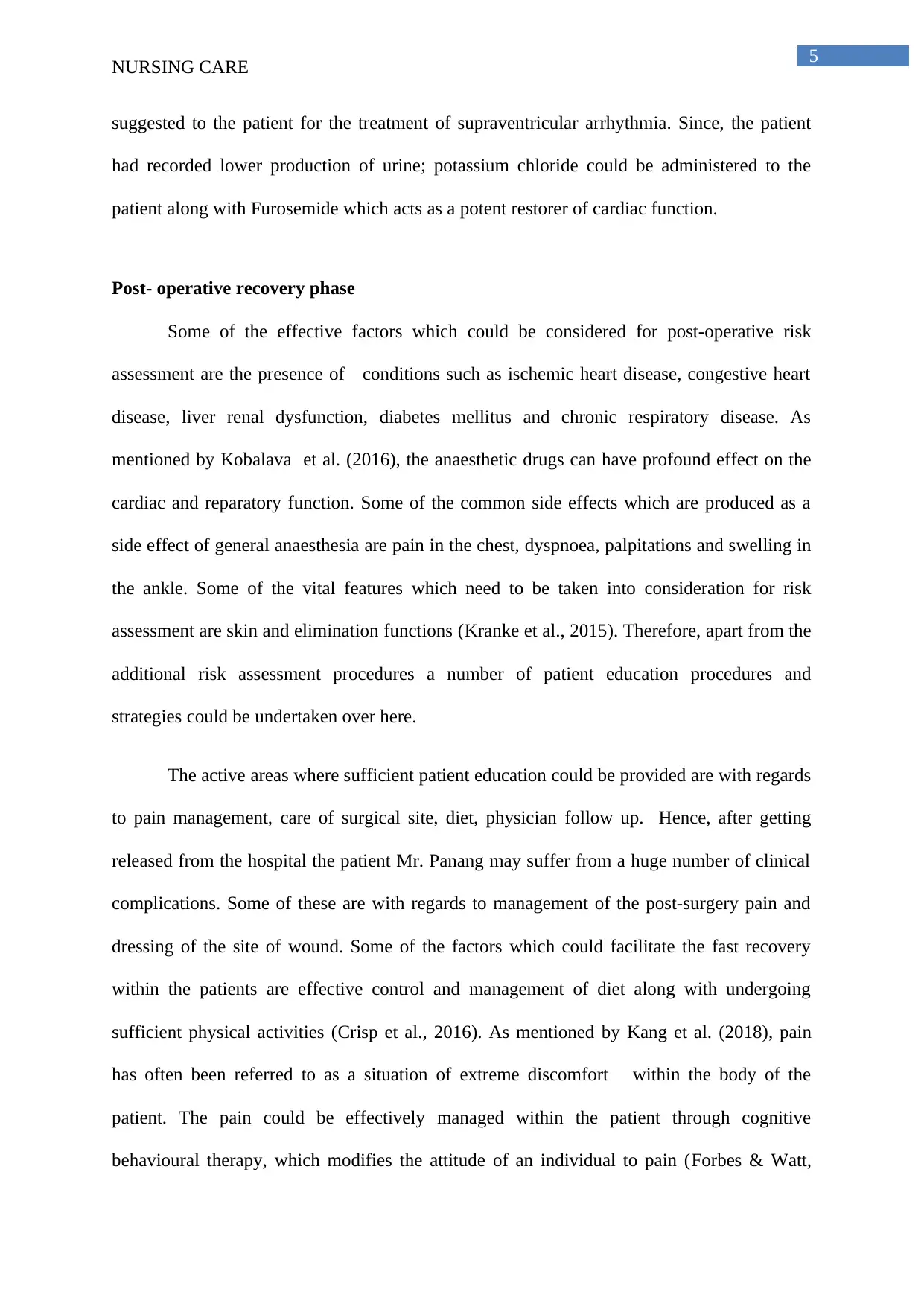
5
NURSING CARE
suggested to the patient for the treatment of supraventricular arrhythmia. Since, the patient
had recorded lower production of urine; potassium chloride could be administered to the
patient along with Furosemide which acts as a potent restorer of cardiac function.
Post- operative recovery phase
Some of the effective factors which could be considered for post-operative risk
assessment are the presence of conditions such as ischemic heart disease, congestive heart
disease, liver renal dysfunction, diabetes mellitus and chronic respiratory disease. As
mentioned by Kobalava et al. (2016), the anaesthetic drugs can have profound effect on the
cardiac and reparatory function. Some of the common side effects which are produced as a
side effect of general anaesthesia are pain in the chest, dyspnoea, palpitations and swelling in
the ankle. Some of the vital features which need to be taken into consideration for risk
assessment are skin and elimination functions (Kranke et al., 2015). Therefore, apart from the
additional risk assessment procedures a number of patient education procedures and
strategies could be undertaken over here.
The active areas where sufficient patient education could be provided are with regards
to pain management, care of surgical site, diet, physician follow up. Hence, after getting
released from the hospital the patient Mr. Panang may suffer from a huge number of clinical
complications. Some of these are with regards to management of the post-surgery pain and
dressing of the site of wound. Some of the factors which could facilitate the fast recovery
within the patients are effective control and management of diet along with undergoing
sufficient physical activities (Crisp et al., 2016). As mentioned by Kang et al. (2018), pain
has often been referred to as a situation of extreme discomfort within the body of the
patient. The pain could be effectively managed within the patient through cognitive
behavioural therapy, which modifies the attitude of an individual to pain (Forbes & Watt,
NURSING CARE
suggested to the patient for the treatment of supraventricular arrhythmia. Since, the patient
had recorded lower production of urine; potassium chloride could be administered to the
patient along with Furosemide which acts as a potent restorer of cardiac function.
Post- operative recovery phase
Some of the effective factors which could be considered for post-operative risk
assessment are the presence of conditions such as ischemic heart disease, congestive heart
disease, liver renal dysfunction, diabetes mellitus and chronic respiratory disease. As
mentioned by Kobalava et al. (2016), the anaesthetic drugs can have profound effect on the
cardiac and reparatory function. Some of the common side effects which are produced as a
side effect of general anaesthesia are pain in the chest, dyspnoea, palpitations and swelling in
the ankle. Some of the vital features which need to be taken into consideration for risk
assessment are skin and elimination functions (Kranke et al., 2015). Therefore, apart from the
additional risk assessment procedures a number of patient education procedures and
strategies could be undertaken over here.
The active areas where sufficient patient education could be provided are with regards
to pain management, care of surgical site, diet, physician follow up. Hence, after getting
released from the hospital the patient Mr. Panang may suffer from a huge number of clinical
complications. Some of these are with regards to management of the post-surgery pain and
dressing of the site of wound. Some of the factors which could facilitate the fast recovery
within the patients are effective control and management of diet along with undergoing
sufficient physical activities (Crisp et al., 2016). As mentioned by Kang et al. (2018), pain
has often been referred to as a situation of extreme discomfort within the body of the
patient. The pain could be effectively managed within the patient through cognitive
behavioural therapy, which modifies the attitude of an individual to pain (Forbes & Watt,
⊘ This is a preview!⊘
Do you want full access?
Subscribe today to unlock all pages.

Trusted by 1+ million students worldwide
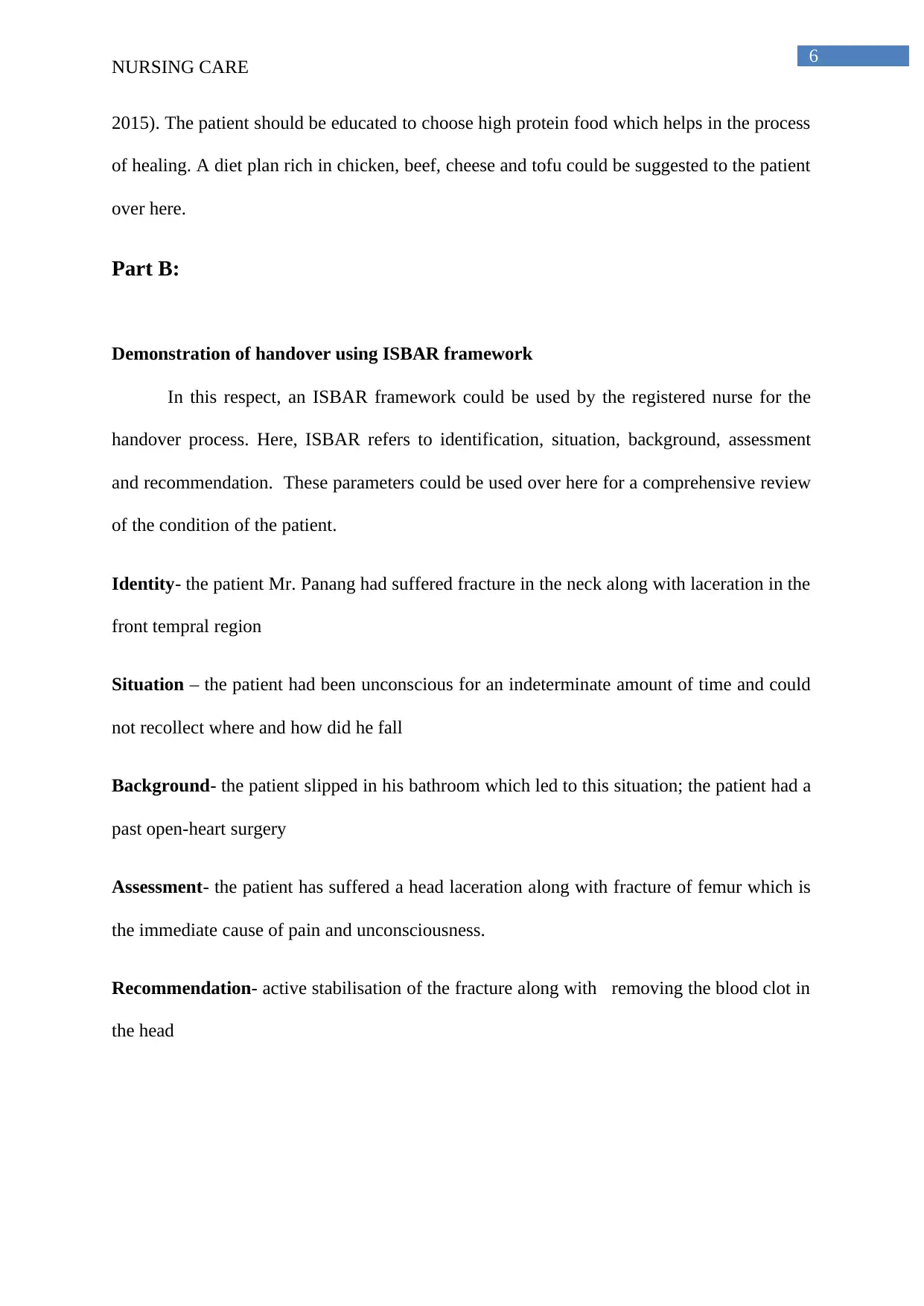
6
NURSING CARE
2015). The patient should be educated to choose high protein food which helps in the process
of healing. A diet plan rich in chicken, beef, cheese and tofu could be suggested to the patient
over here.
Part B:
Demonstration of handover using ISBAR framework
In this respect, an ISBAR framework could be used by the registered nurse for the
handover process. Here, ISBAR refers to identification, situation, background, assessment
and recommendation. These parameters could be used over here for a comprehensive review
of the condition of the patient.
Identity- the patient Mr. Panang had suffered fracture in the neck along with laceration in the
front tempral region
Situation – the patient had been unconscious for an indeterminate amount of time and could
not recollect where and how did he fall
Background- the patient slipped in his bathroom which led to this situation; the patient had a
past open-heart surgery
Assessment- the patient has suffered a head laceration along with fracture of femur which is
the immediate cause of pain and unconsciousness.
Recommendation- active stabilisation of the fracture along with removing the blood clot in
the head
NURSING CARE
2015). The patient should be educated to choose high protein food which helps in the process
of healing. A diet plan rich in chicken, beef, cheese and tofu could be suggested to the patient
over here.
Part B:
Demonstration of handover using ISBAR framework
In this respect, an ISBAR framework could be used by the registered nurse for the
handover process. Here, ISBAR refers to identification, situation, background, assessment
and recommendation. These parameters could be used over here for a comprehensive review
of the condition of the patient.
Identity- the patient Mr. Panang had suffered fracture in the neck along with laceration in the
front tempral region
Situation – the patient had been unconscious for an indeterminate amount of time and could
not recollect where and how did he fall
Background- the patient slipped in his bathroom which led to this situation; the patient had a
past open-heart surgery
Assessment- the patient has suffered a head laceration along with fracture of femur which is
the immediate cause of pain and unconsciousness.
Recommendation- active stabilisation of the fracture along with removing the blood clot in
the head
Paraphrase This Document
Need a fresh take? Get an instant paraphrase of this document with our AI Paraphraser
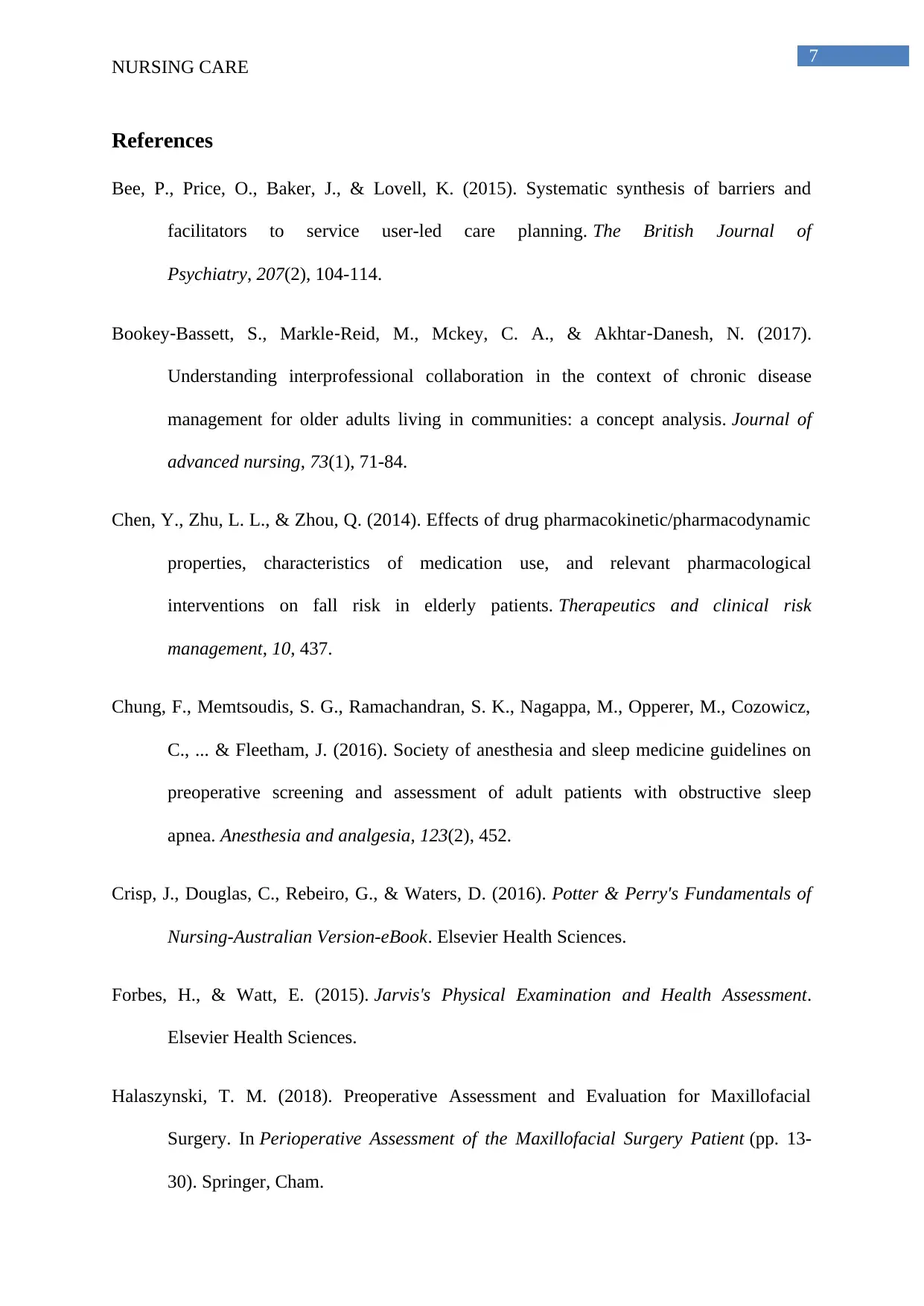
7
NURSING CARE
References
Bee, P., Price, O., Baker, J., & Lovell, K. (2015). Systematic synthesis of barriers and
facilitators to service user-led care planning. The British Journal of
Psychiatry, 207(2), 104-114.
Bookey‐Bassett, S., Markle‐Reid, M., Mckey, C. A., & Akhtar‐Danesh, N. (2017).
Understanding interprofessional collaboration in the context of chronic disease
management for older adults living in communities: a concept analysis. Journal of
advanced nursing, 73(1), 71-84.
Chen, Y., Zhu, L. L., & Zhou, Q. (2014). Effects of drug pharmacokinetic/pharmacodynamic
properties, characteristics of medication use, and relevant pharmacological
interventions on fall risk in elderly patients. Therapeutics and clinical risk
management, 10, 437.
Chung, F., Memtsoudis, S. G., Ramachandran, S. K., Nagappa, M., Opperer, M., Cozowicz,
C., ... & Fleetham, J. (2016). Society of anesthesia and sleep medicine guidelines on
preoperative screening and assessment of adult patients with obstructive sleep
apnea. Anesthesia and analgesia, 123(2), 452.
Crisp, J., Douglas, C., Rebeiro, G., & Waters, D. (2016). Potter & Perry's Fundamentals of
Nursing-Australian Version-eBook. Elsevier Health Sciences.
Forbes, H., & Watt, E. (2015). Jarvis's Physical Examination and Health Assessment.
Elsevier Health Sciences.
Halaszynski, T. M. (2018). Preoperative Assessment and Evaluation for Maxillofacial
Surgery. In Perioperative Assessment of the Maxillofacial Surgery Patient (pp. 13-
30). Springer, Cham.
NURSING CARE
References
Bee, P., Price, O., Baker, J., & Lovell, K. (2015). Systematic synthesis of barriers and
facilitators to service user-led care planning. The British Journal of
Psychiatry, 207(2), 104-114.
Bookey‐Bassett, S., Markle‐Reid, M., Mckey, C. A., & Akhtar‐Danesh, N. (2017).
Understanding interprofessional collaboration in the context of chronic disease
management for older adults living in communities: a concept analysis. Journal of
advanced nursing, 73(1), 71-84.
Chen, Y., Zhu, L. L., & Zhou, Q. (2014). Effects of drug pharmacokinetic/pharmacodynamic
properties, characteristics of medication use, and relevant pharmacological
interventions on fall risk in elderly patients. Therapeutics and clinical risk
management, 10, 437.
Chung, F., Memtsoudis, S. G., Ramachandran, S. K., Nagappa, M., Opperer, M., Cozowicz,
C., ... & Fleetham, J. (2016). Society of anesthesia and sleep medicine guidelines on
preoperative screening and assessment of adult patients with obstructive sleep
apnea. Anesthesia and analgesia, 123(2), 452.
Crisp, J., Douglas, C., Rebeiro, G., & Waters, D. (2016). Potter & Perry's Fundamentals of
Nursing-Australian Version-eBook. Elsevier Health Sciences.
Forbes, H., & Watt, E. (2015). Jarvis's Physical Examination and Health Assessment.
Elsevier Health Sciences.
Halaszynski, T. M. (2018). Preoperative Assessment and Evaluation for Maxillofacial
Surgery. In Perioperative Assessment of the Maxillofacial Surgery Patient (pp. 13-
30). Springer, Cham.
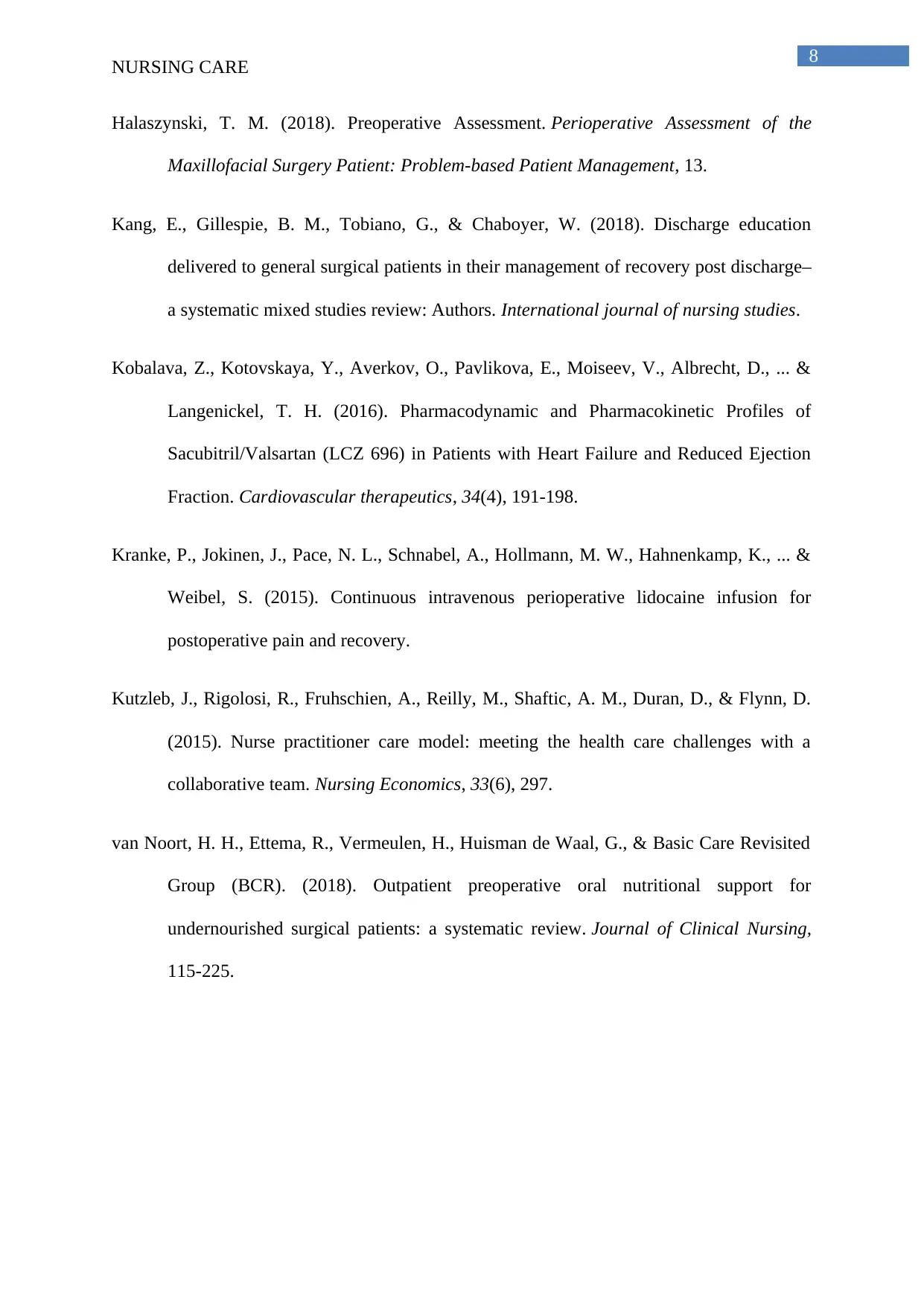
8
NURSING CARE
Halaszynski, T. M. (2018). Preoperative Assessment. Perioperative Assessment of the
Maxillofacial Surgery Patient: Problem-based Patient Management, 13.
Kang, E., Gillespie, B. M., Tobiano, G., & Chaboyer, W. (2018). Discharge education
delivered to general surgical patients in their management of recovery post discharge–
a systematic mixed studies review: Authors. International journal of nursing studies.
Kobalava, Z., Kotovskaya, Y., Averkov, O., Pavlikova, E., Moiseev, V., Albrecht, D., ... &
Langenickel, T. H. (2016). Pharmacodynamic and Pharmacokinetic Profiles of
Sacubitril/Valsartan (LCZ 696) in Patients with Heart Failure and Reduced Ejection
Fraction. Cardiovascular therapeutics, 34(4), 191-198.
Kranke, P., Jokinen, J., Pace, N. L., Schnabel, A., Hollmann, M. W., Hahnenkamp, K., ... &
Weibel, S. (2015). Continuous intravenous perioperative lidocaine infusion for
postoperative pain and recovery.
Kutzleb, J., Rigolosi, R., Fruhschien, A., Reilly, M., Shaftic, A. M., Duran, D., & Flynn, D.
(2015). Nurse practitioner care model: meeting the health care challenges with a
collaborative team. Nursing Economics, 33(6), 297.
van Noort, H. H., Ettema, R., Vermeulen, H., Huisman de Waal, G., & Basic Care Revisited
Group (BCR). (2018). Outpatient preoperative oral nutritional support for
undernourished surgical patients: a systematic review. Journal of Clinical Nursing,
115-225.
NURSING CARE
Halaszynski, T. M. (2018). Preoperative Assessment. Perioperative Assessment of the
Maxillofacial Surgery Patient: Problem-based Patient Management, 13.
Kang, E., Gillespie, B. M., Tobiano, G., & Chaboyer, W. (2018). Discharge education
delivered to general surgical patients in their management of recovery post discharge–
a systematic mixed studies review: Authors. International journal of nursing studies.
Kobalava, Z., Kotovskaya, Y., Averkov, O., Pavlikova, E., Moiseev, V., Albrecht, D., ... &
Langenickel, T. H. (2016). Pharmacodynamic and Pharmacokinetic Profiles of
Sacubitril/Valsartan (LCZ 696) in Patients with Heart Failure and Reduced Ejection
Fraction. Cardiovascular therapeutics, 34(4), 191-198.
Kranke, P., Jokinen, J., Pace, N. L., Schnabel, A., Hollmann, M. W., Hahnenkamp, K., ... &
Weibel, S. (2015). Continuous intravenous perioperative lidocaine infusion for
postoperative pain and recovery.
Kutzleb, J., Rigolosi, R., Fruhschien, A., Reilly, M., Shaftic, A. M., Duran, D., & Flynn, D.
(2015). Nurse practitioner care model: meeting the health care challenges with a
collaborative team. Nursing Economics, 33(6), 297.
van Noort, H. H., Ettema, R., Vermeulen, H., Huisman de Waal, G., & Basic Care Revisited
Group (BCR). (2018). Outpatient preoperative oral nutritional support for
undernourished surgical patients: a systematic review. Journal of Clinical Nursing,
115-225.
⊘ This is a preview!⊘
Do you want full access?
Subscribe today to unlock all pages.

Trusted by 1+ million students worldwide

9
NURSING CARE
NURSING CARE
1 out of 10
Related Documents
Your All-in-One AI-Powered Toolkit for Academic Success.
+13062052269
info@desklib.com
Available 24*7 on WhatsApp / Email
![[object Object]](/_next/static/media/star-bottom.7253800d.svg)
Unlock your academic potential
Copyright © 2020–2026 A2Z Services. All Rights Reserved. Developed and managed by ZUCOL.





